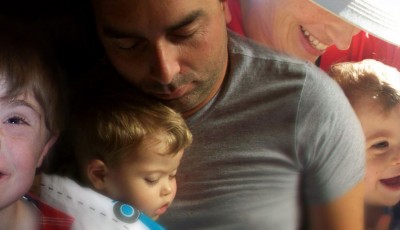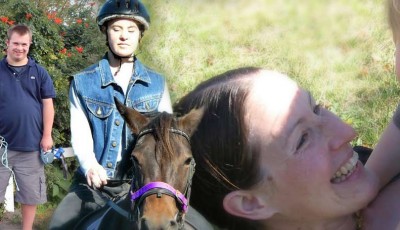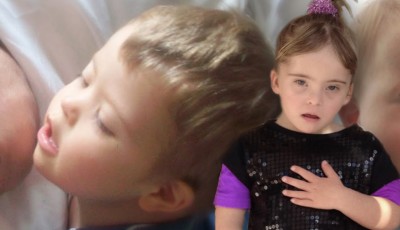
Submissions to the Health and Disability Commissioner
Submissions to the National Screening Unit

A complaint before the International Criminal Court

A group submission before the Human Rights Commission
Our Seminar - Loving Every Child: Defying Eugenics
60 Minutes feature: Down but not out
LATEST: Submission to the US Supreme Court
In November 2013 Saving Downs was one of three Down syndrome advocacy groups that filed a legal brief with the U.S. Supreme Court urging them to address inequalities that discriminate against those prenatally diagnosed with Down syndrome.
The brief urges that the principle of support to the parents be aligned with the Prenatally and Postnatally Diagnosed Conditions Awareness Act and the American Disabilities Act.
A decision by the Court of whether to rule on the case is expected in the US Spring 2014.
The full legal brief can be read here.
Update: The Supreme Court declined to hear the appeal on 13 January 2014.
Submission to the Health and Disability Commissioner
In 2010, a complaint from Saving Downs was upheld by the Health and Disability Commissioner on the unbalanced quality of information produced by the National Screening Unit (NSU) in relation to the antenatal screening programme for Down Syndrome and other conditions.
This has resulted in significant positive changes in the policy and presentation of the programme as outlined under the section on the NSU.
The National Screening Unit
In response to the complaint to the Health and Disability Commissioner that was upheld, the NSU has been revising the consumer resources and health practitioner guidelines associated with the programme.
Draft revised guidelines were completed in March 2012 and issued to invited parties for comments. Saving Downs made detailed submissions on these and we are awaiting the revised documents.
Two key areas of our submissions are that pregnant women and their partners must be advised that:
- Participation in the screening pathway imposes more harm than benefit to their unborn child, through miscarriage and morbidity due to diagnostic testing, and
- That any benefit to the unborn child should be investigated as late as feasible in the pregnancy, to avoid harm.
We have also submitted that the NSU consumer pamphlet and guidelines be amended to recognise that an abortion on the basis of a diagnosis of an unborn child with Down syndrome is unlawful, as it does not meet the test of “a serious handicap” required under New Zealand law.
As part of the submission process the NSU has agreed to move away from the routine offering of screening for Down syndrome to all pregnant women to simply advising them of the availability of screening. We see this is a positive step forward – for more information see our press release here.
This line of social justice advocacy seeks to ensure that the NSU provide accurate, balanced and non discriminatory information to parents considering screening.
UPDATE: The revised consumer pamphlet and guidelines were issued in February 2013 and Saving Downs secured a number of important and welcome changes to the national screening programme. See our press release here and our detailed blog about the changes here.
The case before the International Criminal Court
Background
Saving Downs lodged an application with the International Criminal Court (ICC) in June 2011 against the New Zealand Government’s screening programme for Down syndrome. The Office of the Prosecutor advised in June 2012 that they had commenced a formal preliminary examination into our complaint – see our press release here.
The basis of the complaint is that the screening programme targets unborn children with Down syndrome and other rare conditions such as Spina Bifida for birth prevention. New Zealand is signatory to the Rome Statute, under which the ICC operates. The persecution of an identifiable group of the civilian population through birth prevention is prohibited under the Statute. We consider that the Down Syndrome community is protected under these provisions of international law.
Key aspects of our complaint are:
- The emphasis is on the intent and consequences of the screening programme;
- Genetic screening and selective abortion is the means of birth prevention;
- Birth prevention is funded and facilitated by the NSU;
- The Down Syndrome community is being targeted through their biological identification in-utero and their births prevented; and
- We are seeking resolution of our complaint without prosecutions.
The complaint references Government Cabinet papers obtained under the Official Information Act stating the outcomes of the programme will be a reduction in the number of births of people with Down syndrome, with around 90% of unborn children diagnosed with the condition being terminated. The programme is promoted and funded by the government at a cost of $9.4M per year, or around $75,000 per unborn child diagnosed with Down syndrome.
For a more detailed overview of the ICC case – see our Loving Every Child – Defying Eugenics presentation available here.
The preliminary examination
A preliminary examination by the ICC is the analytical process by which the Prosecutor assesses whether there is a reasonable basis to proceed with a detailed investigation. For more details see the ICC web site here.
We welcome this examination as an unprecedented step towards respecting the lives of those with Down syndrome, Spina Bifida and other conditions. Such people live awesome lives, are loved members of their families and communities, and should be afforded the full protection of international law on an equal basis with all.
SavingDowns and Spina Bifida New Zealand are calling on the New Zealand Government to immediately cease persecuting the Down syndrome and Spina Bifida communities through birth prevention. Antenatal screening must be solely directed towards ensuring these unborn children and their parents are provided with life affirming care. By doing so, the Government can affirm their respect for all human life, including those with Down syndrome, Spina Bifida and other conditions.
The ICC operates under the principle of complementary. This means that the Prosecutor would encourage domestic resolution in New Zealand as part of the preliminary examination process. We therefore expect that domestic resolution will be secured through the preliminary examination.
In this regard our intended outcomes are:
- The ICC determines that people with Down Syndrome are a protected group under Articles 6 and 7 of the Rome Statute;
- The ICC directs that screening programmes that reduce the population of people with Down Syndrome through birth prevention programmes are impermissible;
- Securing policy changes to ensure that genetic screening is solely directed towards life affirming care;
- The repeal of “foetal abnormality” as grounds for abortion; and
- The ICC publishes a public report on the legal issues at the heart of the preliminary examination such that these can be carried forward into the international arena.
The resolution of this complaint will have widespread positive implications for the international Down Syndrome community.
For an update refer to this press release outlining that additional evidence is to be provided to the court. This evidence will be presented to the Court on completion of the work plan around bio-ethical issues and disability that is currently underway by the New Zealand Human Rights Commission (see below).
Submission to the Human Rights Commission
UPDATE: 14 August 2014 – In a world first, Saving Downs has secured a commitment from the New Zealand Human Rights Commission (HRC) to address prenatal discrimination against the Down syndrome and wider disability communities. The HRC has agreed to give high priority to this work under their monitoring role for the United Nations Convention on the Rights of Persons with Disabilities (CRPD). The work will include the right to life, prenatal disability screening, euthanasia and other bioethical issues. Most importantly the perspectives of disabled people and their families will be central to the work. For an update read this blog.
Background:
The CRPD gives voice, visibility and legitimacy to disabled people and their issues in New Zealand and the rest of the world. The HRC have responsibility for resolving issues relating to the CRPD. The CRPD is an important international instrument for protecting the rights of our community and has direct application in the area of antenatal screening for disabilities
Thirteen organisations have resolved to formally support such a submission and to be involved in further meetings and discussions as the issue moves forward. These organisations are:
- Down Syndrome International,
- The New Zealand Down Syndrome Association,
- Disabled Persons Assembly NZ Inc,
- People First New Zealand Inc. – Nga Tangata Tuatahi,
- The Tiaho Trust,
- Spina Bifida Association of New Zealand,
-
Asperger’s Syndrome/Autistic Spectrum New Zealand (ASNZ), and organisations allied to ASNZ including Aspiehelp, Aspergophobia, Autistic Union, Aspire Trust and the Wider Wellington ASD Group, and
- Saving Downs.
We have asked that the HRC:
- Generally enquire into the issue by reviewing the Ministry of Health’s programme “Antenatal screening for Down syndrome and other conditions” against the principles of the CRPD;
- Develope an action plan where there are areas of conflict between the programme and the CRPD, and
- Oversee and monitor the implementation of such an action plan.
The HRC have reviewed the submission and are currently developing a work plan around bio-ethical issues and disability that will incorporate this work.
This line of social justice advocacy seeks to ensure that the NSU comply with the principles and objectives of the CRPD, including the following key objectives:
- Respect for the inherent dignity of people with varying ability;
- Non-discrimination ;
- Full and effective participation and inclusion in policies that impact on our communities;
- Respect for difference as part of human diversity and humanity; and
- The presentation of any screening programmes to be based in a social model of disability and not a medical model of disability.
For a detailed overview of the submission, please read our blog “Antenatal screening, disability rights and the CRPD”.
This initiative is likely to have widespread positive implications internationally for those countries that have ratified the CRPD.
Seminar: Loving Every Child: Defying Eugenics
“It is one of life’s great paradoxes that the most gentle, loving and enduring amongst us have always been the target of the eugenicists – those with Down syndrome: the very people who embrace those defining human qualities of unconditional love and compassion.”
The Down syndrome community has witnessed with grave concern the return of eugenics in New Zealand under the guise of prenatal health care, reproductive choice and human rights. It is inflicting serious harm on our unborn children, parents and the Down syndrome community.
In response to this SavingDowns and Family Life International NZ held a one-day seminar “Loving Every Child: Defying Eugenics” on the 4th August 2012 in Auckland. The seminar was an opportunity to learn about the history of eugenics and its recent emergence into New Zealand society. The seminar raised awareness around the issue and mapped out a response towards restoring respect and dignity towards the Down syndrome community.
For the presentation, click here.details – some type of link to powerpoint presentations,
60 Minutes feature: Down but not out
The eugenic nature of the screening programme was exposed in TV3’s 60 Minutes documentary “Down but not out’‘ on 12 June 2011.
The 60 Minutes documentary was introduced with the statement “people with Down syndrome may soon disappear from the face of the earth.” 60 Minutes revealed the new screening programme was introduced without public consultation and the Ministry of Health “did not bother” asking the opinion of anyone who has Down syndrome, about the programme.
Mike Sullivan, father of three-year-old Rebecca Sullivan who has Down syndrome, featured in the 60 Minutes documentary. He said people with Down syndrome and other disabilities are human beings who live full and rewarding lives. “They must be treated on an equal basis with other members of our society, without any form of discrimination.”
De-Anne Jensen, mother of three with her oldest son having Down syndrome also featured on 60 Minutes. “Government documents say it costs less not to have children with Down syndrome around, so it looks like they are working to do away with Down syndrome. It’s cheaper; you don’t have to pay for the special needs things. The Government and medical experts are putting a monetary value on our baby’s lives,” Mrs Jensen said.
Latest Saving Down Syndrome blog posts
Saving Down Syndrome on Twitter
- RT @queenswash: WOOP WOOP! 🎉 thanks @NATFilmAwards Amazing news!!! https://t.co/4TGUdgTLMM yesterday





